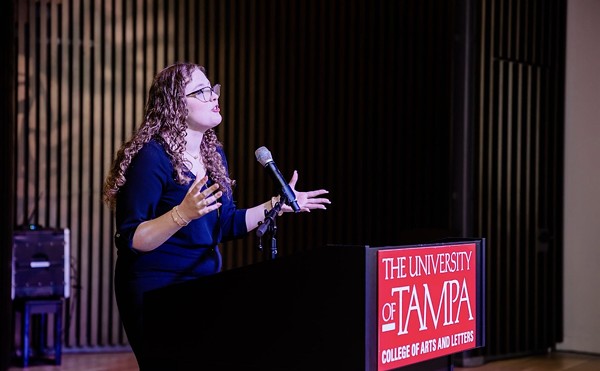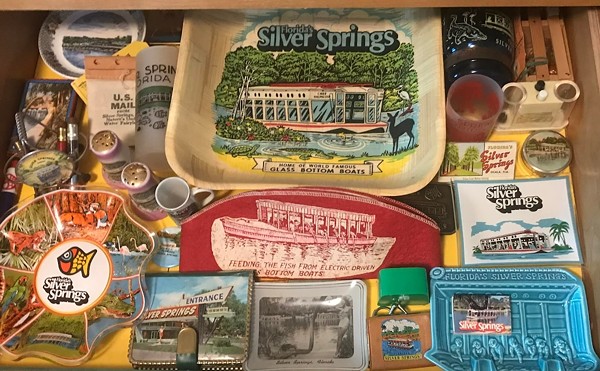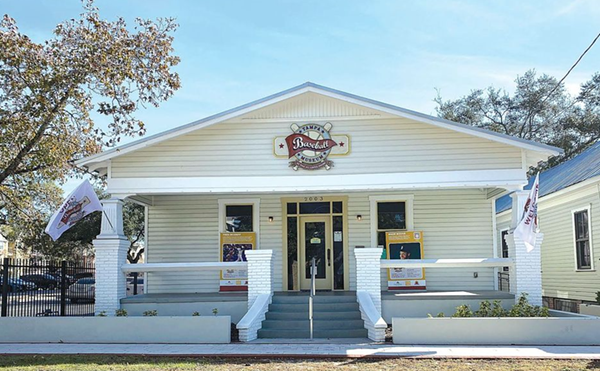The Complete Works of William Shakespeare (abridged) is silly, sloppy fun, a hit-and-miss assault on the Bard that at best is hilarious and at worst is (pleasantly) sophomoric. Jobsite Theater actors Jason Evans, David Jenkins and Robert Ray Morgan romp joyously through Shakespeare's loftiest creations, demolishing everything that comes in sight without ever suggesting less than respect for the noble edifice they're wrecking. There may not be an exact equivalent for what these comedians do — think one part Three Stooges, one part Saturday Night Live, and one part fraternity talent show — but they do it so exuberantly, with so much delight in every cascade of spittle, every crotch-grab and pratfall, that you can't help but have a good time watching them. OK, this isn't brilliant comedy, but it has its hilarious moments, and should entertain not just bard-o-philes, but those who could never figure out what's to like in As You Like It.
The defining word for The Complete Works is "travesty." And so, on a bare stage, with no props save for a portrait of Shakespeare flanked by two rudimentary coats of arms, Evans, Jenkins, and Morgan distort and pervert all 37 of Shakespeare's dramas. Sometimes they do so in a group (the history plays as a hasty, messy game of touch football) and sometimes in particular (Hamlet as drama-therapy, with different parts of the audience representing Ophelia's id, ego and superego). The jokes and routines come fast and furious, and no sooner has Evans jumped on Morgan's back to do the balcony scene in Romeo, than the star-crossed lovers have expired and Morgan is strumming his guitar and singing "Now They're Dead" like Richie Havens.
My favorite moments: Jenkins' desperately anxious fencing; Evans' increasingly absurd use of women's wigs; a hilarious three-man rap version of Othello; an abbreviated Hamlet in reverse; and Evans, again, spewing water from his mouth in order to portray the drowning of poor Ophelia (bring a swimsuit if you sit in the first two rows). Also pleasing are the pseudo-Renaissance costumes in which all three actors begin the show (attributed in my program to "The Dark Lady of the Sonnets"). Slowest sections: Titus Andronicus as a cooking show, and Evans and Morgan pretending that they don't want to or can't play in Hamlet. Convincing comedy or not, though, all three actors, following Katrina Stevenson's wise direction, deliver themselves unashamedly to the show's raucous demands; and there are even a few moments when they treat Shakespeare's lines with real seriousness. Come to think of it, even at their wildest, these actors always seem, like the script's writers (Adam Long, Daniel Singer and Jess Winfield), to honestly love Shakespeare's work.
Maybe that's why The Complete Works, frat house energy and all, still feels like a satisfying tribute to history's greatest playwright.
Half of Zora. One wants a couple of things from a stage biography. First, of course, the life itself, the personal trajectory and the background — social and historical — that explains it. Then there's the subject's personality, her moral character and emotional tenor, the individual as you or I might have known her. With only one of these approaches, you get disembodied facts or ahistorical portraiture. With both, you get a sense of life as it really is, a meeting of a time and a temperament, of a society and a soul. It's the latter of these approaches — the emphasis on personality over context — that Zora Neale Hurston, Laurence Holder's play currently showing at the Shimberg Playhouse of the Tampa Bay Performing Arts Center, mostly offers us. In less than an hour-and-a-half, Holder allows us to become acquainted with a delightful and formidable woman. But he leaves so much out in his rapid accounting of the facts, we come away only half-satisfied. The fragmentary nature of the show is all the more frustrating because Melanna D. Gray, who portrays Hurston, is such a fine actress, and because "ranney," who plays four of the important men in her life, is so convincing in each role. With performers like these, we might have learned and felt a great deal in the course of the evening.
Which isn't to say that Zora utterly ignores the factual details. It just moves through them so quickly that we never have time to experience them.
In the first five minutes, Hurston blasts through the formative moments in her early life: her girlhood in Eatonville, Fla., the impact of her preacher father, the death of her mother, her problems with her stepmother, mistreatment by relatives, job as a "lady's maid" with a traveling Gilbert and Sullivan troupe, and eventual enrollment at Howard University.
Then she meets husband-to-be Howard Sheen. And the play takes a breath. Zora now lingers over a few important encounters — with Langston Hughes, who agrees to collaborate on a play that will "make the world see that Negroes are everything people ought to be;" and with anthropologist Franz Boas, who ridiculously asks her to study an ostensible correlation of intelligence and cranial size.
The Boas escapade out of the way, events speed up again: Hurston heads South to collect folklore, finds a rich patron, publishes fiction and a work of anthropology, visits Haiti, writes Their Eyes Were Watching God, which offends Alain Locke and Richard Wright, is falsely accused of sexually abusing a child, loses her publishers, and returns, unbowed, to Eatonville.
End of play.
It's been a sprint, and we were just getting interested. Did it all have to blur by so fast? Well, at least there's Gray's and "ranney's" fine acting. Wendy Leigh's direction is pleasantly free-form, and Eric Davis' choreography is equally jazzy. But Michael DuMouchel's set, featuring strangely artificial furnishings, detracts from the illusion of reality created by the acting and directing. The repeated use of black, white and red, not only in the set but in Rick Criswell's costumes, is a nice idea, though, and makes for a stylish visual unity.
This play's got acting, direction and, to a certain extent, design.
What it lacks is an attention span.


















